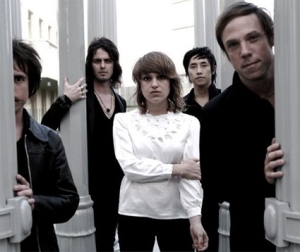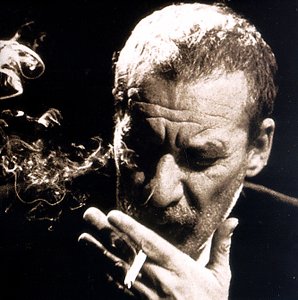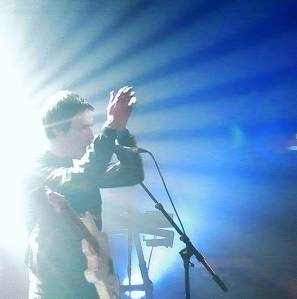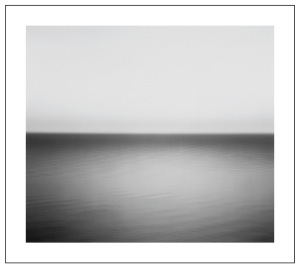
It would be fair to say that you’re having a bad week when your doctor diagnoses you with a potentially life-threatening auto-immune disease; your mother reveals she has cancer and your girlfriend walks out on you all in the space of a few days. In such a situation, many people would question the fairness of life; a few may even sink into despair. Mikel Jollet probably did both before channeling his energy and feelings into a collection of songs which would eventually become one of 2009’s outstanding rock albums.
As the old saying goes, out of adversity often comes creativity. Jollet came out of his “week from Hell” with a new perspective and, after deciding to leave his promising literary career behind, set about taking his band, The Airborne Toxic Event, from local LA celebrities to nationwide phenomenon. In the six months since releasing their debut album in August last year, the Los Feliz five-piece have been the band to name-drop in the US. Now it seems the juggernaut of critical acclaim has overtaken the band’s tour bus somewhere on a distant highway, leaving The Airborne Toxic Event to put the pedal to the metal in an attempt to keep up.
The result has meant that, here in Europe where their album is not even released yet, Jollet and Co. are arriving at smaller venues expecting to play the kind of “paying your dues” shows that all new bands from the US have to go through, only to find packed, breathless crowds clamouring for their stories of damaged goods, broken hearts and lost souls. “We’ve been pretty shocked by the reaction,” Jollet says. “It’s not something that we ever expected because the record’s not even out in Europe for a couple of months. It just seems weird that so many people know who we are. It’s like we’ve been on this whirlwind. We’re this local band from LA who made this homemade record…We just figured we’d slug it out like every other indie rock band in history and tour for ten years.”
“It’s hard to get some perspective on what people like about us,” he adds. “I think the live show is a real factor; we tend to have a lot of screaming, jumping around and a lot of movement so that might have something to do with it. As for the record…I don’t know. I’m just glad that people seem to be connecting with it.”
Their current European tour has taken TATE to toilets and bus shelters up and down the length and breadth of the old continent, putting them in contact with the weird and wonderful characters that Europe has lurking in its most distant corners. Jollet and his band, it seems, take playing to a bunch of backwater weirdoes in their immaculately suited stride.
“We’re probably the weirdest people in the room when we play,” the singer deadpans. “We come to get down with people, we like our fans a lot and half the time we’re in the audience and half the time the audience is on the stage so we don’t make a lot of distinction about those things. We come along and play some songs and, you know, we’re in the room too. We hear of bands coming over here and meeting people who want to get into fights but we haven’t had that. We’re more likely to be the first to jump into the fight anyway. We’re just as wired to mix things up as anyone.”
While the album has been steadily reaching new levels of popularity back home, it’s the single Sometime Around Midnight which has provided The Airborne Toxic Event with their breakthrough in Europe. A slow building narrative based on a personal experience of heartbreaking rejection, it’s a song which shows Jollet’s undoubted talent for storytelling and his willingness to lay bare his life and experiences. Apart from its rolling musical power, the song has an honesty that legions of fans have connected with.
“Kurt Vonnegut used to say that the first rule of writing is that the writer must impugn himself, to not be afraid to look like an idiot and not be afraid to say things that are true,” Jollet says. “A politician’s job is to say popular things that aren’t true whereas an artist’s job is to say things which are true but unpopular. I think there is something in saying ‘well, you know, this happened and it’s all fucked up’. I think some people relate to that. Others are uncomfortable with that. They want their rock bands to be disinterested and cool but that’s not who we are.”
More calculating rock stars may have tried to suppress the personal traumas which have become intrinsically linked with the story of his band but Jollet accepts that his period of trial is now public knowledge and continues to feed his own experiences into his work.
“That’s the deal if you’re an artist, right? People are going to know you,” he says. ”I feel it comes with the territory. My job is to write stories and to observe the world. I try and write about things that are affecting me and hopefully relate that to other people. I’m just writing songs and it seems that if you’re a songwriter you have to trade on some pretty personal stuff. It feels fine to me.”
“This whole thing of music as a coping mechanism, that wasn’t true for me,” he adds. “All that stuff happened but then a lot of good things happened too. I just wrote a record about it. It’s not like I needed to do it to cope or have catharsis.”
Jollet may have strayed from his initial career path, one which he hoped would lead to him writing the Great American Novel, but the latent novelist in him is being put to good use in TATE’s growing cannon of narrative-driven rock songs. However, while bouncing along the highways and byways of Europe, the singer-songwriter still wonders aloud about his choices, his new artistic direction and the one he left, maybe only temporarily, behind.
“I was a writer for a few years and all this feels a little absurd,” he says. “I should be on my second novel right now and married with a kid or something but I’m in this bus with a bunch of my friends, touring around and playing all these shows all the time. So sometimes this feels weird but most of the time it’s very natural.
“Suddenly, for whatever reason, all I wanted to do was play music…which was a kinda irresponsible decision! I had quite a promising writing career going and then I fucked it up with this rock band.”
The prospect of writing the next record, the almost mythic “difficult” second album, doesn’t faze Jollet. But questions remain. Where will the stories come from now that the “week from Hell” has been dealt with? Is he now living experiences which fans will get to hear about in the next year or so? Where will the inspiration come from now things are finally looking up?
“Who knows? Am I going to make another heartbreaking record or write an album without having to go through some horrible times, I hope so and I think so,” he says. “We already have about seven songs for the new record. Joe Strummer of the Clash said if you want to write songs then just look around you, everything you want to write about is where you look so I think that’s pretty much where the second record will come from.”
Right now, the sometimes raw subject matter of Jollet’s songs from that dark period is their stock and trade. And far from shying away from it, fans have embraced the vulnerability and honesty.
At TATE’s show at the Muziekodroom in Hasselt on April 24, their first time in Belgium, the crowd is packed in like sardines. For a band which has yet to release its album in mainland Europe, they soon find that, with all things, where there’s a will there’s a way and the crowd sing along to songs they have no right to know about yet. The band responds in the way which has helped drive on the monster they have created. They rip through their set with an intensity and physicality as though it could be their last. Knowing that life can change in a second, maybe that’s how Jollet works. Maybe that’s why his band is living for the moment and maybe that’s why so many people are willing to join them.
While you can never really be sure what’s going to happen next, you wouldn’t bet against The Airborne Toxic Event being one of the biggest bands on the planet by the time they return to Europe later in the year for festival performances which could be triumphant, and, dare I say it, life-affirming.
Originally Published in The Bulletin Magazine, Brussels (www.thebulletin.be)

 The road to success more often than not starts off as a tiny strip of flattened grass. Simple beginnings which lead to greatness can make the rise to fame that much more intriguing. An upbringing miles away from the bright lights of the pinnacle of a career makes us all believe that this is possible.
The road to success more often than not starts off as a tiny strip of flattened grass. Simple beginnings which lead to greatness can make the rise to fame that much more intriguing. An upbringing miles away from the bright lights of the pinnacle of a career makes us all believe that this is possible. For all aspiring Mod bands, the choice is a stark one: you either aim to be the new Jam or face the heinous consequences; that being the possibility of ending up as the new Ocean Colour Scene.
For all aspiring Mod bands, the choice is a stark one: you either aim to be the new Jam or face the heinous consequences; that being the possibility of ending up as the new Ocean Colour Scene. In an interview at the start of this year, U2 announced their return to the rock arena by saying that if they got No Line on the Horizon right, then 2009 would be theirs. After listening to the new album by the Biggest Band in the World, the likes of Coldplay and Radiohead have – sadly – nothing to worry about.
In an interview at the start of this year, U2 announced their return to the rock arena by saying that if they got No Line on the Horizon right, then 2009 would be theirs. After listening to the new album by the Biggest Band in the World, the likes of Coldplay and Radiohead have – sadly – nothing to worry about.